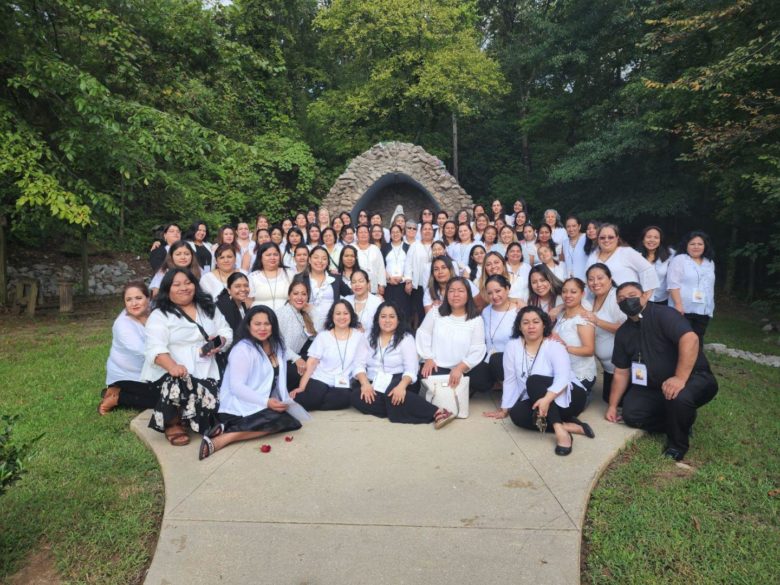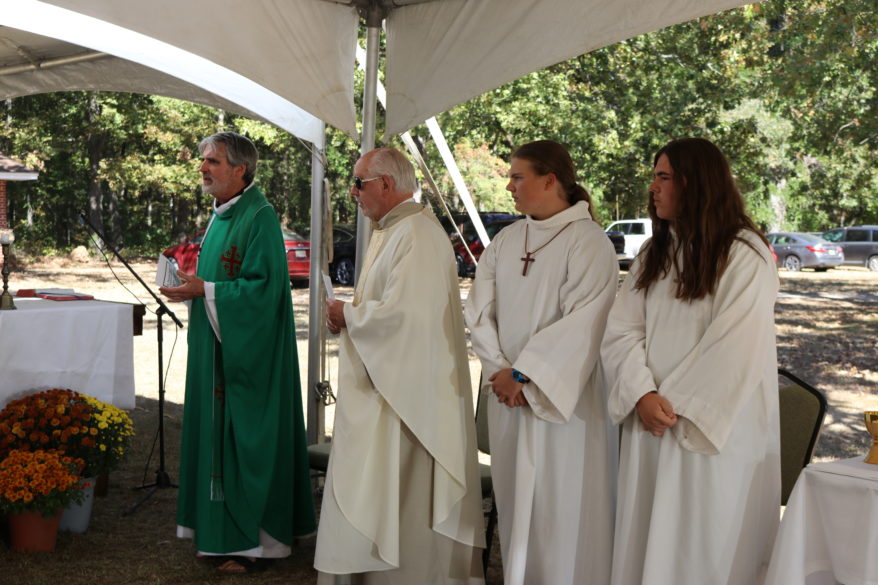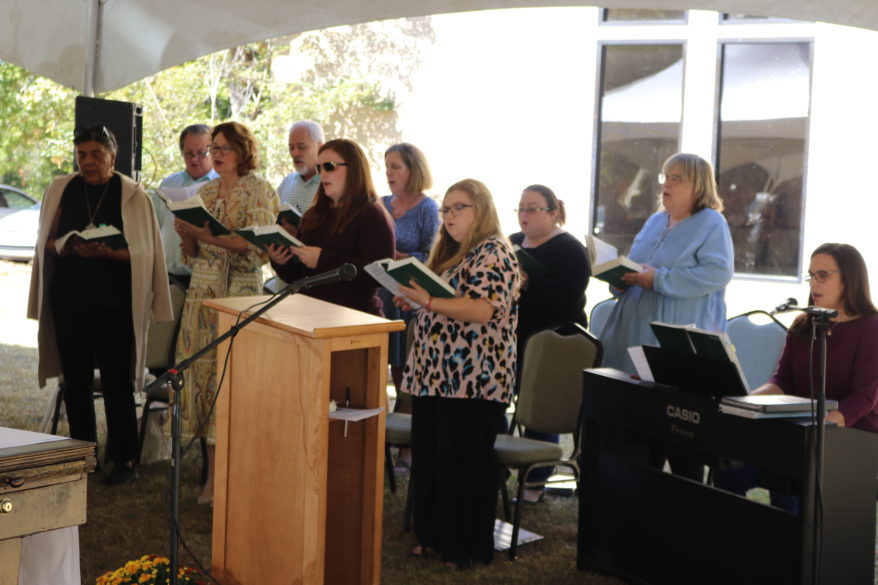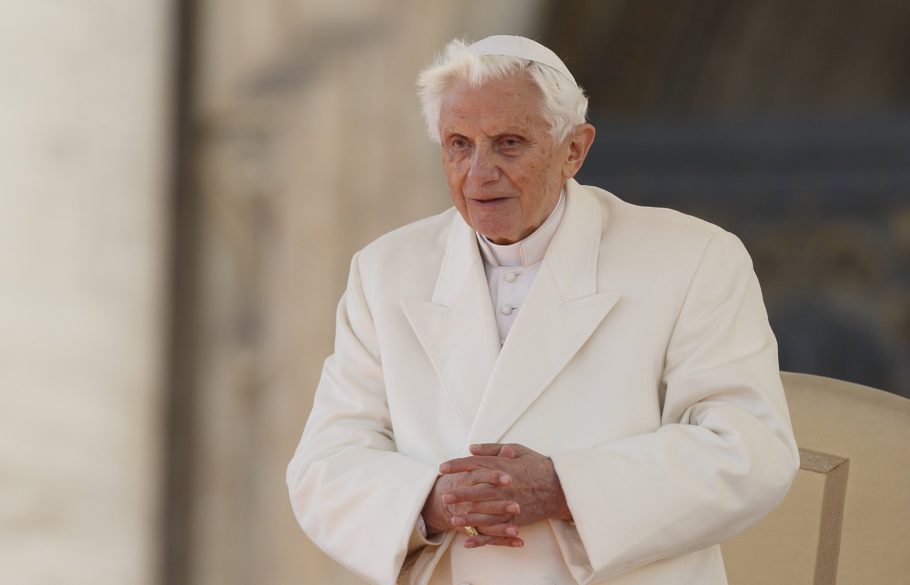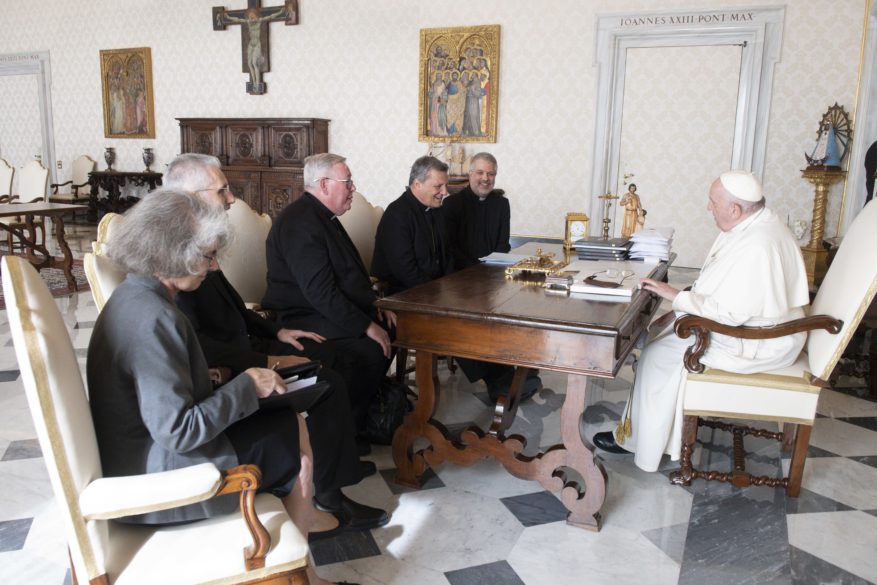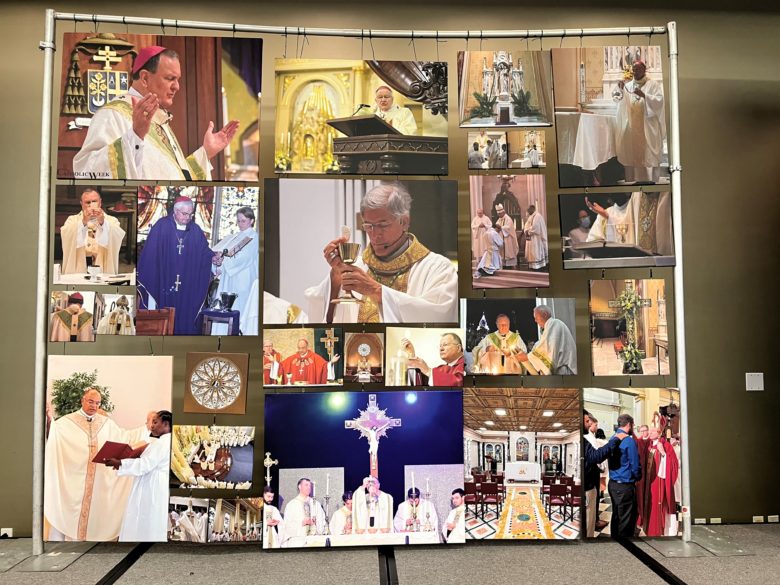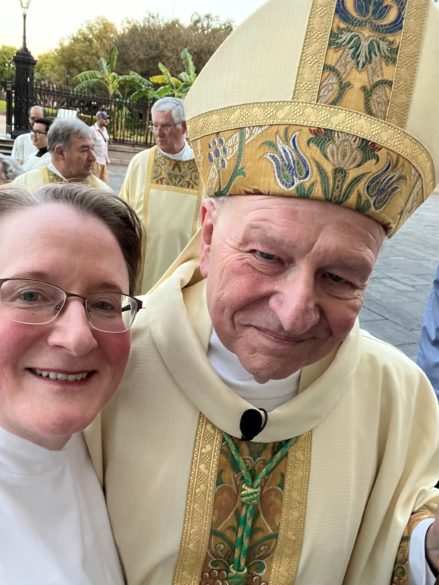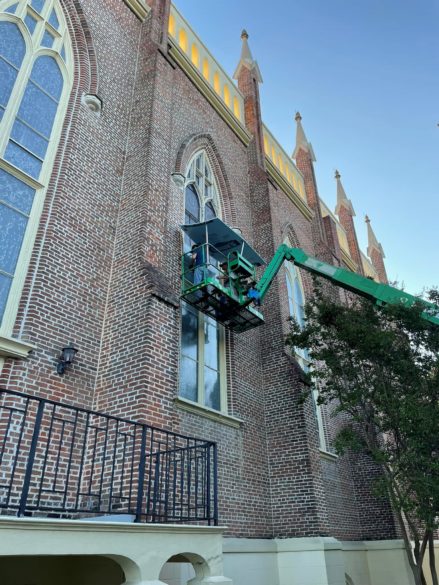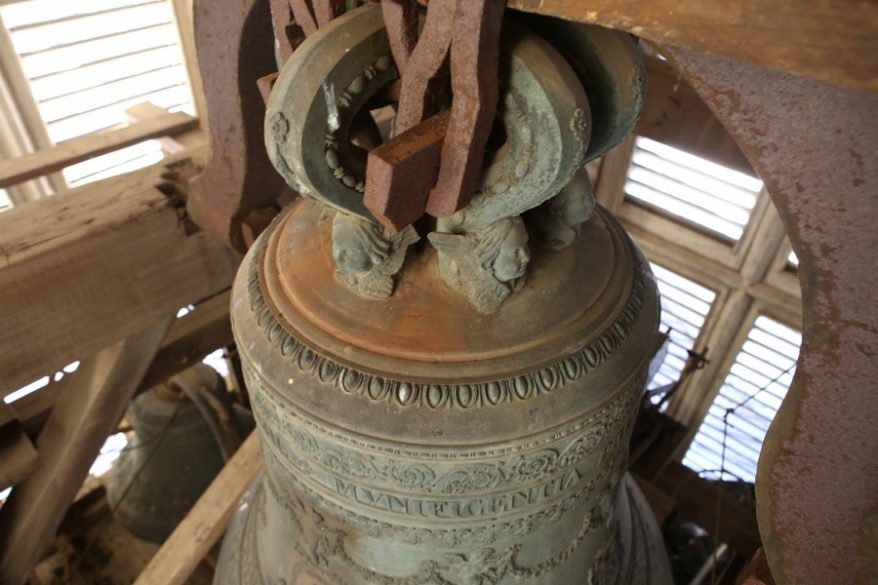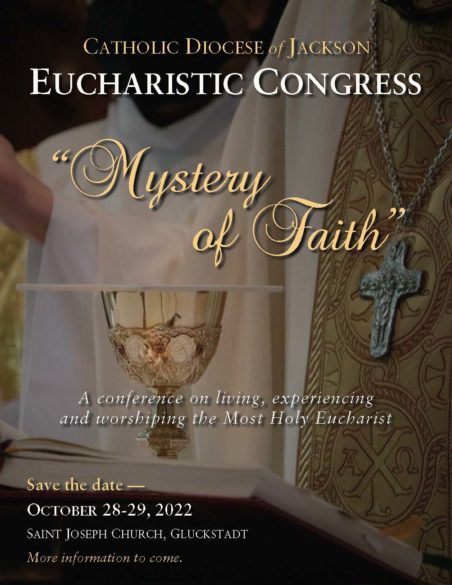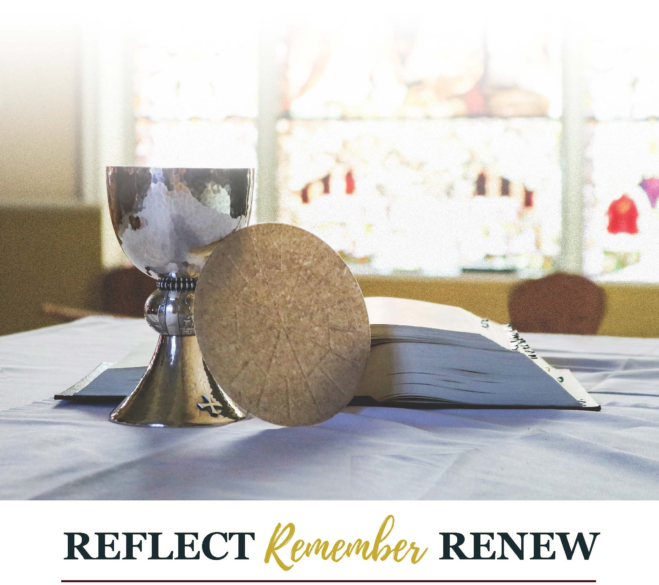Por Monseñor Michael Flannery
SALTILLO, Mex. – Recientemente, tuve el singular placer de estar presente en la celebración de la Fiesta de San Miguel Arcángel, el 29 de septiembre, patrón de nuestra misión en Saltillo. Pasé 6 días en la misión.
La visita a San Miguel para mí fue un retiro. Tuve la oportunidad de renovar viejas amistades y hacer nuevas. Debo decir que la misión está prosperando. El Padre David Martínez, el párroco, continúa el buen trabajo iniciado, hace más de 50 años, por el Padre Quinn. El nuevo pastor asociado allí es el Padre Antonio Medel González.
El Padre Elevio Casarubias que había estado asistiendo al Padre David, fue cambiado recientemente a otra parroquia en Saltillo. Sin embargo, sí llegó para la Fiesta de San Miguel. El diácono transitorio Adam Frey, de la Diócesis de Biloxi, estuvo presente este verano para su pasantía diaconal y fue un miembro valioso del personal parroquial durante cuatro meses. El mismo, acaba de regresar al seminario de Notre Dame, Nueva Orleans en preparación para su ordenación sacerdotal que tendrá lugar en mayo de 2023.
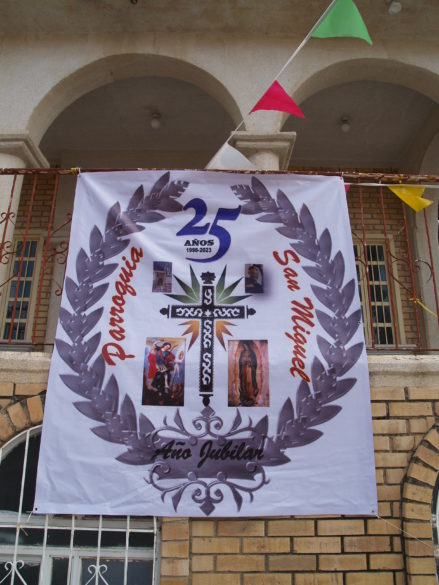

Monseñor Flannery hace 25 años fue un testigo esencial de la separación de San Miguel de la parroquia del Perpetuo Socorro, para ser ahora una parroquia por derecho propio y el centro de los ranchos que alguna vez fueron parte de la misión del Padre Quinn. Monseñor Flannery, junto al Padre David, celebra (arriba) a una quinceañera en la iglesia de La Brecha.(debajo) Cartel conmemorativo para celebrar los 25 años de la iglesia de San Miguel dentro de la Misión de Saltillo en Mexico. Este cartel ondeará por todo el año en San Miguel. (Fotos cortesía de Monseñor Flannery)
Actualmente, estamos sirviendo a las siguientes iglesias dentro de la ciudad de Saltillo: San Miguel, Cristo Rey, San Juan Diego, Santos Mártires, San Guillermo y Nuestra Señora de Guadalupe. Además de estas iglesias, la misión sirve a 34 pueblos de montaña. Toma hasta 5 horas de viaje para llegar al pueblo más remoto. Todos los pueblos tienen visita al menos una vez al mes de los curas de San Miguel. El martes es el día preferido por los sacerdotes para descansar de sus apretadas agendas. Esto se interrumpe si hay un funeral al que asistir o alguien necesita los últimos ritos de la iglesia.
San Miguel está situado en la colonia de Vista Hermosa. Está en lo alto de la montaña y de noche tienes abajo una hermosa vista de la ciudad de Saltillo. La ciudad de Saltillo se encuentra a 5,000 pies sobre el nivel del mar. En 2015 la población era de 807 mil y ahora se estima en más de 1.000.000. Cuando comenzó la misión en 1968, la población se estimaba en 200 mil. La sede de la misión estaba en la Iglesia del Perpetuo Socorro y en 1998 nos mudamos a San Miguel tras la muerte del Padre Patrick Quinn de feliz memoria. Monseñor Michael Thornton de la Diócesis de Biloxi fue nombrado el primer párroco de San Miguel. Siguiéndolo venía el Padre Bill Cullen, Padre Richard Smith y el Padre Benjamin Piovan de la Arquidiócesis de Nueva Orleans.
Con la escasez de sacerdotes en las diócesis de Biloxi y Jackson, se tomó la decisión de pedirle al obispo de Saltillo que nombrara un sacerdote local para San Miguel. Ambas diócesis continuarían con el apoyo financiero.
Hay grandes planes en marcha para celebrar el jubileo de plata de San Miguel en 2023. El primer edificio en San Miguel fue construido por el Padre Quinn como un centro de retiro capaz de albergar a 100 participantes, completo con una capilla. Fue construido en honor del hermano de Patrick Quinn, Padre Michael, un sacerdote en Irlanda que murió de un tumor cerebral. El siguiente edificio que se agregó fue una iglesia para servir a la comunidad local. La estructura actual de la iglesia fue construida por el P. Benjamin Piovan en 2009. Todo esto fue posible gracias a la generosidad de la gente de las Diócesis de Biloxi y de Jackson.
Se ha formado un comité ad hoc para planificar las celebraciones del año jubilar en 2023. Una gran vela con el símbolo del año jubilar grabado, arderá para cada celebración que tendrá lugar en San Miguel durante todo el año jubilar. Un representante de cada una de las otras iglesias bajo la jurisdicción de San Miguel está en el comité para coordinar las actividades en las iglesias delineadas. A la celebración del jubileo serán invitados los sacerdotes que han ministrado en la parroquia, así como el obispo de Saltillo, el obispo Joseph Kopacz y el obispo Louis Kihneman. En cada Misa, se rezará una oración especial por el año jubilar al final de la Misa. Durante el Adviento está prevista una misión parroquial especial, no solo en San Miguel sino también en las iglesias delimitadas dentro de su jurisdicción.
La gente de los 34 ranchos adjuntos a San Miguel también será parte de la celebración. Se planean algunas renovaciones menores, como: poner un sellador de clima en la torre de la iglesia y pintar los edificios.
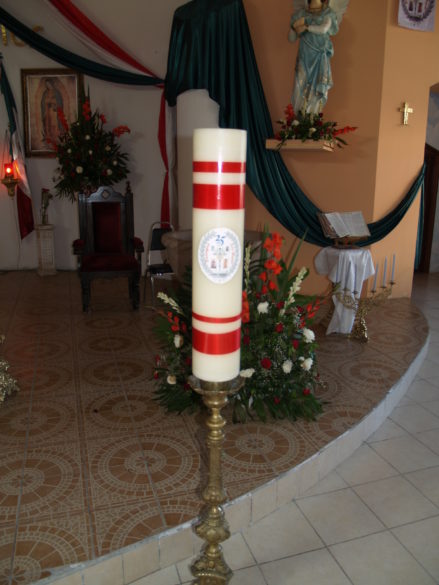
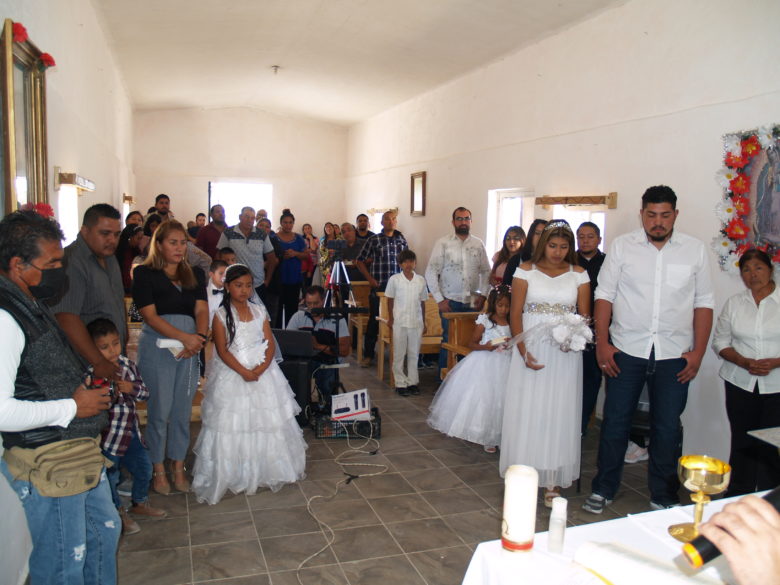
En su visita a la Misión de Saltillo, (Izq) una boda y cinco primeras Comuniones en Gómez Nueva fueron celebradas por Monseñor Flannery y el Padre David. (der.) Vela conmemorativa de los 25 años de la Misión de Saltillo, creada para la ocasión para que arda por un año en la iglesia de San Miguel Arcángel (Fotos cortesía de Monseñor Flannery
Durante mi visita tuve el placer de celebrar Misa en la Iglesia St. William. Había una señora allí y algo me dijo que la conocía de algún lugar. Empezamos una conversación y le pregunté de dónde era originalmente. Ella dijo que de Santa Rosa. Le pregunté cuándo nació y me dijo que en 1972. Le pregunté dónde la bautizaron y me dijo que en Santa Rosa. Resulté ser el sacerdote que la bautizó. No la había visto en 50 años. Era como un reencuentro para volver a conocerla después de tanto tiempo.
Un fenómeno nuevo en Saltillo es la construcción de columbarios en las iglesias parroquiales para la recepción de las cenizas de los feligreses fallecidos. Eso ha venido en respuesta a la creciente práctica de la cremación en México. Los precios varían de $600 a $1,000. Se ha vuelto muy popular.
Un gran impulso en el ministerio de la Misión de Saltillo es el servicio a los pueblos de montaña. Acompañé al Padre David el sábado pasado a los pueblos de montaña. Nuestra primera parada fue Gómez Nueva donde tuvimos una boda y cinco Primeras Comuniones. Después de una recepción nos trasladamos a La Brecha, que es una iglesia que fue dedicada hace tres años por el obispo Raúl Vera López, obispo emérito de Saltillo, en presencia de los obispos Kopacz y e Kihneman.
En La Brecha tuvimos una quinceañera, la celebración de los 15 años de una niña. Durante la celebración de la Misa, la joven de 15 años renueva sus promesas bautismales y se compromete nuevamente al servicio del Señor. Desde allí viajamos a otro pueblo, El Rancho Pequeño, para otra celebración de quince años. Luego regresamos a Saltillo donde el Padre David tuvo un bautismo.
Una cosa es segura, al pastor nunca le falta trabajo en San Miguel.

